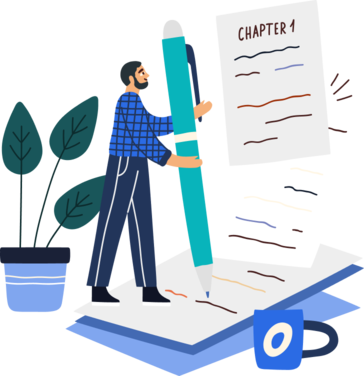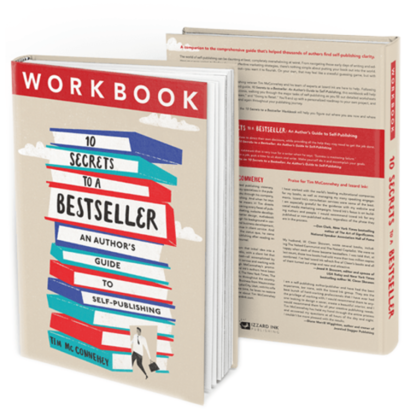TRADITIONAL VS. SELF-PUBLISHING
WHICH IS RIGHT FOR YOU?
Are you interested in publishing a book, but aren’t sure where to begin? There’s never been a wider range of options available for getting a book into the hands of readers, whether through the digital marketplace or the shelves of bookstores. In fact, this abundance of publishing choices can be overwhelming, particularly for first-time authors.
Authors should take stock of their own needs, skills, and goals when deciding which publishing route is right for them.

Working With a Traditional Book Publisher
Lengthy Process
Not so long ago, the only real option was to hire an agent to shop your book around to a handful of major publishers. While the prospect of getting a well-respected industry giant to pay you for your book was, and still is, enticing to many authors, there are some considerable downsides.
For one, this process can take several years instead of the time it takes to self-publish, or the months you’ll spend working with a hybrid or collaborative publisher. For another, it’s often difficult for great authors to get these deals in the first place.


Handling Rejections
Since they’re investing in a book, traditional publishers are extremely selective, and sometimes a quality book with great writing gets ignored because it doesn’t fit into what’s considered most marketable in a particular moment.
Plenty of successful books were initially rejected by publishers, including classics like Moby Dick, Catch-22, and Lord of the Flies. More recently, books like the Harry Potter series, Twilight, and Life of Pi faced many rejections by publishers before they finally became household names.
Uncertain Results
Increasingly, even traditional publishers are leaving it up to authors to justify how their book is marketable, rather than selecting quality writing and using their own experts to solve the marketing puzzle.
Imagine how many other great books never saw the light of day just because they didn’t fit with the trends of what major publishers felt they could easily market at the time. In other words, just being a great writer is no guarantee you’ll get a traditional publishing deal. You also need to have the right idea at the right time, and to have the right person see it.


Financing Your Book
The fact that they’re risking an investment in a book also means you’ll lose a lot of creative control and rights to your book when you sign on with a major publisher, not to mention the lion’s share of the earnings.
A typical book advance for a debut author is about $5,000 (or, more accurately, from $1,000 to $10,000), and your profit on each book is likely to be 10% of the sales price, at least at first. You have to “pay back” that $5000 with your portion of the sales before you start to make money on your book in the form of royalties, and even then the publisher is likely to withhold some of your royalties against returns.
What to Compromise
Traditional publishing is certainly still worth considering for authors that want the cachet and reputation boost of getting published the traditional way. If that is your goal, it could be worth considering a traditional book publishing company. If going that route, authors should not get too invested in having the final say on their book’s cover, title, or marketing campaign, and be satisfied with a small percentage of the overall earnings, instead of the bulk of their book’s profits over the long run.


Established Audience
As for your chances of a traditional publishing deal, authors with an established platform—an audience that might already be interested in reading their book—will have the best chance of earning a traditional publishing deal. In specific terms, publishers often look for authors that have a viable path to selling 25,000 books in the first month of sales. Perhaps you have an established following as a public speaker, on social media, or an email list. Otherwise, they may not even consider a publishing deal.
Self-Publishing Platform
- On the opposite end of the spectrum, platforms like Amazon allow you to publish a book entirely on your own. These digital platforms were the first to undercut the dominance of traditional book publishing companies, but it’s a bare bones process with no support and no quality control.
- With this kind of book publishing company, you won’t need anyone’s approval, but you also won’t have any expert input. Your book will be published along with several hundred others that day—data suggest that a new book is released on Amazon every five minutes. You’ll keep the majority of your earnings, but without help on the rest of the publishing process, those earnings are often quite limited.
There’s little benefit in keeping your earnings if you’re barely selling any books.


- The author best suited for this category of book publishing company would be one with skills that go far beyond writing, or one with low expectations for sales. Since it’s so easy to publish this way, there’s been a flood of fairly low-quality books.
- To stand out and have the chance to publish a bestseller, an author would need the skills to properly edit their own book, design the interior and cover, market their book, and more. Each one of these steps of the publishing process involves a skillset and an industry of its own.
Few, if any, authors will have the skills they need for every step of this process, even if they excel at one or two.
- Otherwise, this publishing route is ideal for authors that don’t want to invest much money or time in the process, and mostly want to be able to say they have a book available. It may not earn much in the way of sales, won’t be available in bookstores, and most often, won’t reach the level of quality that readers generally expect from books—but it is a published book that can serve publicity or marketing purposes adequately.

What Is a Hybrid Book Publishing Company?
Finding a Common Ground
For the purposes of this article, we’ll use this term as a catch-all for a variety of companies that aim for a middle ground between self-publishing and traditional publishing. For more details on all the types of companies this includes, check out our article on self-publishing companies.
Companies like this represent a growing part of the market, as the prestige and control of traditional companies begins to decline, and as solo self-publishing becomes increasingly inadequate to stand out.


Providing Assistance
These companies supplement the self-publishing process with help for authors in editing, marketing, distribution, and design. If you don’t have an established platform, a book publishing company like this could offer to get your marketing process off the ground. If you’ve written a book that needs editing, these companies can offer that as well.
Many will even help with distribution and bring your book to as many digital bookstores as possible, as well as to brick and mortar stores. By working with the same experts in the field, there’s not much that a traditional publisher can offer that the top tier of these companies can’t.
Working with Industry Leaders
The best hybrid publishers will connect authors with industry experts that have experience publishing bestsellers for traditional publishers. These insiders will know the time-tested design and marketing methods that these companies have used for decades to attract readers, and multiple types of editors will filter out the kind of mistakes that make books tougher to read.
At the same time, you’ll retain the final say over aspects like title, cover, design, and marketing that a traditional publisher would choose for themselves. More crucially, you’ll hold on to all or most of your book’s earnings after the publishing process is taken care of.


Value Creation
The only real downside to working with these companies is the initial investment. While the prospect of a traditional deal could include an advance, the process with hybrid publishers will usually start with an investment from the author. That investment will pay off in terms of book sales, and unlike with a traditional book publishing company, you’ll hold on to all of your book’s earnings after that initial investment.
The ideal author for this publishing method would have confidence in their book, want to have a say in the process while remaining open to expert input, and would be aiming to take their book as far as possible to become a bestseller. They would be willing and able to invest in themselves, knowing that higher sales and full control over earnings will pay off in the long-run.
Choosing a Book Publisher
The advent of digital self-publishing has put more control in the hands of authors, undermining the power that a handful of large companies had wielded for decades. That’s a good thing, and it’s already opened up the publishing world to new content; but at the same time, it’s opened the floodgates not only for mediocre writing, but also for great writing that hasn’t been given the attention it deserves.
Given that they can publish their books either way, it’s up to authors to invest in their work. Finding the right book publishing company is about striking a balance between these extremes.

How We Work

Plan
We assist you with this crucial first step by doing a manuscript assessment. We then strategize together to come up with a plan to align with your goals and vision.

Pick
We carefully curate 2 to 3 publishing professionals for you to choose from, for each step of the process—all experts with years of experience and proven results.

Publish
We will be working on your behalf in the background, navigating all the other details to make sure your project is ready to be published.

Yes, it’s Personal
You will have a dedicated book publishing consultant who is here to guide you and answer all of your questions, every step of the way.
Ready to Start Your Publishing
Journey?
Ready to Start Your Publishing Journey?
Looking for More Free Resources?

Download Our Exclusive Workbook for Self-Publishing Authors
The Workbook will provide you with tools to:
- Define your goals. A free consultation is just the beginning.
- Refine your manuscript. Make necessary edits and remove any over-staging.
- Create a business plan for your book. This will empower you to begin the process of self-publishing.
Subscribe for Self-Publishing Pro Tips and Free Resources Delivered Directly to Your Inbox
(We don't send emails often, but when we do, we make sure it counts)

